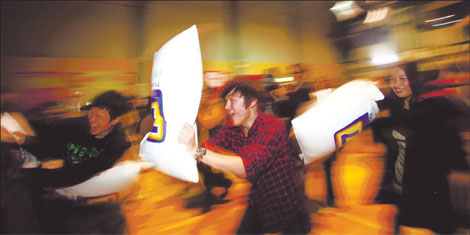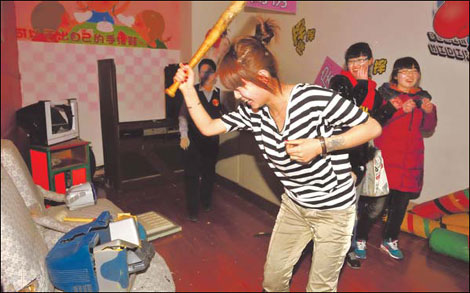|

Shanghai white-collar workers enjoy a mass pillow fight. Intensive workloads, the difficult job market, high housing prices and relationship problems are some of the reasons behind rising urban stress. Gao Erqiang / China Daily
|
Young urbanites are increasingly turning to stress relief services that range from smashing up things, to rooftop trysts and even a walk in a cemetery - all for a fee. Sun Li and Erik Nilsson investigate
The woman swings the baseball bat into the TV screen, which puckers into a cobweb of ruptured glass. Another woman clasps both hands around a mallet's handle and pounds the crumpled husk of an air conditioner. Yet another woman bombards the wall with a salvo of ceramic plates. They burst on impact and their shards clank onto the mass of dismembered dinnerware in the corner.
"This feels awesome," the woman lobbing plates says. "I want to do it in my (real) home."
Welcome to the Rage Cage, a space set up in 2009 to provide women a chance to burn off fury at Happy Family shopping mall in Liaoning's provincial capital Shenyang. The women swap their cash for a baseball bat and one minute to let loose on a "home" designed to conjure thoughts of their own.
"Almost all of the women felt satisfied after they destroyed something and made a mess," says employee Zhu Ying.
The Rage Cage closed its doors a few months ago, because it was part of a seasonal promotion, but the service is part of a stress-release industry that's proliferating as white-collar urbanites grapple with the ongoing reinvention of society.
Office workers and university students are swearing at hired strangers over the phone, engaging in mass pillow fights, hanging out in graveyards, camping on high-rise rooftops and purposefully acting like children - usually for a fee.
"There's no doubt people are facing pressure that's so tremendous they desire ways to ease it," East China Normal University's Institute of Sociology head Wen Jun says.
"So, it's no surprise the market is responding, conjuring businesses providing stress relief."
Clients feel frazzled about intensive workloads, the difficult job market, rocketing housing prices, and relationship and family problems, service providers say.
Wen, who conducted field research on white-collar stress in Shanghai's Pudong district, says the demographic's adventurousness makes it an ideal target for the industry.
That's why a university student in Nanjing, who would only give his surname, Wu, says he tried one of the myriad services on Taobao.com, in which customers phone up and verbally abuse strangers.
"I used vicious language I'd never used before to the person who answered. I imagined him to be one of those people who looked down on me," says Wu, whose frustration boiled up after failing to find a job.
"After cursing him, I breathed a big sigh of relief. I feel better about looking for work."
A keyword search brings up thousands of such phone services.
Customers pay an average of 1 yuan ($15 cents) for a 10-minute session, during which they can say anything they want, any way they want.
An anger-release phone service owner in Zhengzhou, Henan province, who goes by her Internet handle of Xiao Xuan, says she has had more than 300 customers since starting her business a month ago.
She believes she's merely answering the call of the market.
"It's a hot business because people have so many reasons to vent anger," she says.
About half of her customers are men, aged 20 to 30, who are disgruntled with their bosses, colleagues and careers. University students frustrated with romance and job hunting are the second largest group.
"One man pretended I was one of his colleagues, who always flirted with the boss and backstabbed workmates," Xiao recalls.
"Another guy spoke to me as if I were his miserly employer in a foreign company, who assigned him so much work he never got to rest."
While some incarnations of the stress-release industry entice the cathartic venting of wrath, others offer more distractive - yet at least as peculiar - pressure mollification techniques.
Shanghai's Fu Shou Yuan graveyard opened its gates to office workers, advertising free daylong visits to help people soothe their strained nerves in 2007. When the tours proved to be a hit, a half-dozen other cemeteries followed suit.
The general manager of Fu Shou Yuan Group's corporate planning department, Luo Yuanyuan, says the visits have a "spiritual message" for those teetering toward burnout. The graveyard receives dozens of white-collar visitors every week, and she expects more.
Huang Long, who works for a Shanghai-based foreign trade corporation, made his first trip to Fu Shou Yuan after seeing an ad on a bus' mobile TV. It made him wonder "how being in a graveyard melts away stress".
"I was expecting something horrific, like a haunted house, that would scare my stress away," the 28-year-old says.
"It was the opposite kind of experience I never imagined walking around a burial ground could be so relaxing. It's a garden with classical-style monuments and lively sculptures far from the hustle and bustle."
Huang has become a regular visitor to this place of "escape".
"It inspires solemn thoughts about life I hardly have time to ponder when working."
Such a search for a hideaway from the crush of city life is what drives members of the Cat Rain Club to spend nights on the rooftops of Shanghai's high-rises.
The trend started when Yu Peiyun was approaching meltdown because her bar was about to go belly up in 2005.
"To get rid of the anxiety about my bar, I invited some friends to chat and drink on the rooftop," Yu recalls.
"Gazing at the stars, relaxing in the cool night breeze and gossiping was so much fun that we didn't want the night to end. So we put up a tent and slept there."
The club's marketing manager Liu Wei says participants are white-collar workers seeking a moment removed from their lives.
"(They) often complain about rocketing housing prices or working overtime," Liu says. "Many say the rooftop provides an interesting atmosphere to release pressure."
Dong Jinting, an IT worker who regularly camps on Shanghai's rooftops, says the outings provide a convenient getaway, since her work schedule leaves no time for traveling.
"In other public places, barbecuing, playing music and singing together loudly is impossible," Dong says.
"But you can do it on a rooftop, and camping there doesn't simply mean sleeping outdoors. Staying overnight with strangers or friends in a quiet corner of the bustling city is really great for white-collar workers."
Several rooftop camping clubs have started in the city in recent years, Liu says.
Intensifying urban stress appears to make people act more childishly.
A record number of adults, most of whom were born in the 1970s or 80s, rode roller coasters together, played hide-and-go seek or sat in mock primary classrooms, in Guangzhou, Nanjing and Hangzhou, on Children's Day this year.
More than 80 percent of the 750 respondents of a www.zdiao.com survey said the holiday is a "good outlet to alleviate work pressure".
Xiong Yan, a 28-year-old employee of a Guangdong-based company, says Children's Day is more about adults than kids to him.
"I have a tight schedule every day, which is mostly devoted to running business errands. I envy the carefree and happy children so much."
So, he took the day off work and went to an amusement park with friends, where they sang, jumped and played like youngsters.
"It was the best Children's Day gift I ever got," he says.
Fudan University sociologist Gu Xiaoming says there's good reason Chinese of this age covet innocence.
"This generation encountered tremendous pressures that former generations didn't - worrying about housing, caring for their children and parents and so on," Gu says.
The Deputy Director of the Chinese Academy of Sciences' Institute of Psychology Professor Zhang Jianxin believes it's to be expected that such stress-busting industries are becoming popular, partly because the country lacks psychological counselors.
But he believes these industries' harmful impacts could be their undoing.
"If you always curse on the phone, you might start using ferocious language in real life, and smashing objects may make you addicted to violence," Zhang says.
"Worst of all, if you pay for services that allow you to act without restraint, it might make you believe you can do anything you want if you have enough money."
But that doesn't mean people can't find release, he says.
"People can also release stress through exercise, basking in sunshine or walking in the park. These are healthier ways to ease the mind."
|

A woman swings a baseball bat into a TV set at a stress-release bar in Shenyang. Li Lin / For China Daily
|
(China Daily 12/30/2010 page18)
|


